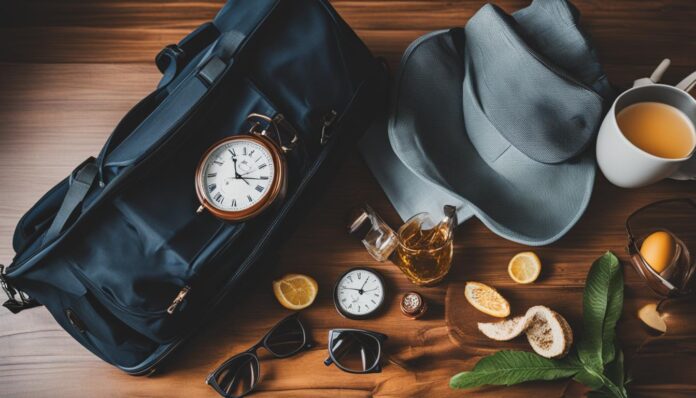If you love to travel, then you probably know how challenging it can be to prevent jet lag while traveling. It’s hard to enjoy your destination when you’re exhausted, irritable, and feeling unwell. But, what if there were some simple yet effective strategies that could help minimize the effects of jet lag? In this section, we’ll show you how to prevent jet lag and share some of the best jet lag prevention strategies for preventing jet lag while traveling.
Whether you’re traveling for business or pleasure, jet lag can interfere with your travel plans and negatively impact your experience. It’s important to understand what causes jet lag and how it affects your body’s internal clock. But, don’t worry, we’ll guide you through the process of minimizing its symptoms. So, let’s dive in and explore the best ways to avoid jet lag and make your travel experience more enjoyable!
Understanding Jet Lag and Its Effects
If you’re an avid traveler, you’re probably no stranger to jet lag. Jet lag is a condition that occurs when your body’s natural clock, known as the circadian rhythm, is disrupted due to changes in time zones. This can lead to a range of physical and mental symptoms, such as fatigue, irritability, insomnia, and indigestion.
It’s important to understand the effects of jet lag on your body, as they can impact your overall well-being during and after a long journey. Some of the effects of jet lag include:
- Disturbed sleep patterns
- Fatigue and exhaustion
- Headaches and dizziness
- Mood swings and irritability
- Indigestion and bowel problems
Jet lag can affect people differently, and the severity of the symptoms may vary depending on factors such as age, health, and the number of time zones crossed. However, there are several jet lag prevention strategies available to help minimize or even eliminate the symptoms.
Adjust Your Sleep Schedule
One effective way to reduce the symptoms of jet lag is by adjusting your sleep schedule before and during your trip. By doing this, you can help your body more easily adapt to the new time zone, minimizing the impact of jet lag on your body.
| Jet Lag Prevention Tips – Adjust Your Sleep Schedule: |
|---|
| Gradually shift your sleep and wake time a few days prior to your trip to align with your destination’s time zone |
| Use light to regulate your circadian rhythm by exposing yourself to bright light in the morning at your destination |
| Avoid napping for too long during the day, especially upon arrival at your destination |
| Try to get enough sleep on a consistent schedule before and during your trip to avoid exhaustion or overfatigue |
Remember, adjusting to a new time zone can take a few days. Don’t be discouraged if you don’t see immediate results. Stick to your schedule and give your body the time it needs to adapt.
It’s also good to consider a comfortable sleep during your travel. Invest in a good travel pillow or blanket, and bring a comfortable pair of socks to help you sleep better on the plane.
Stay Hydrated
One of the best ways to prevent jet lag while traveling is to stay hydrated. Dehydration can lead to headaches, fatigue, and other symptoms that can exacerbate jet lag.
Before your flight, make sure you drink plenty of water and avoid caffeine and alcohol, which can dehydrate you. During your flight, aim to drink at least 8 ounces of water every hour, and avoid sugary or carbonated drinks that can dehydrate you further.
After your flight, continue to drink plenty of water to help your body adjust to the new time zone. Tip: Carry a refillable water bottle with you throughout your trip to make it easier to stay hydrated.
“Water is a crucial component in regulating your body’s sleep-wake cycle. Proper hydration can help reduce fatigue and headaches during your journey and make it easier to adjust to new time zones.”
Top Drinks to Stay Hydrated While Traveling
| Beverage | Description |
|---|---|
| Water | The most effective way to stay hydrated and prevent jet lag |
| Coconut Water | Packed with electrolytes and a natural source of hydration |
| Herbal Tea | A great option for staying hydrated and relaxed |
| Broth or Soup | Good source of salt and can help replace electrolytes lost during flight |
Remember, staying hydrated is vital to preventing jet lag while traveling. Make sure you plan ahead and take steps to ensure you stay hydrated before, during, and after your journey.
Avoid Alcohol and Caffeine
When traveling, it’s essential to keep your body hydrated to minimize the effects of jet lag. Avoid consuming alcohol and caffeine, as they can worsen dehydration and disrupt your sleep patterns. Instead, opt for natural remedies to maintain your energy levels and promote relaxation before and during your flight.
“Alcohol and caffeine can dehydrate your body and worsen the symptoms of jet lag. Instead, try natural remedies to promote relaxation.”
Some natural remedies for jet lag include:
- Herbal teas
- Water with lemon or cucumber slices
- Fruit and vegetable smoothies
In addition to natural remedies, taking a nap or meditating during your flight can also help you feel more well-rested when you reach your destination.
Adjust to the Destination’s Time Zone
One of the most effective ways to prevent jet lag is by adjusting to the local time zone soon after arriving at your destination. This means setting your watch to the destination’s time and starting your daily routines, such as eating or sleeping, accordingly. It may be tempting to stay up late or nap during the day, but doing so will only prolong the time it takes your body to adjust.
Try these practical tips to help you adjust more quickly:
- Avoid sleeping during daytime hours.
- Get plenty of sunlight during the daytime.
- Stay active during the day to reduce fatigue.
- Drink plenty of water and avoid caffeine and alcohol.
You can also take melatonin supplements to help regulate your sleep and wake cycles. However, it’s best to consult your doctor before taking any supplements, especially if you are taking other medications.
Remember, adjusting to a new time zone takes time and patience. Be kind to yourself and give your body the rest and relaxation it needs to adapt to the new schedule.
Get Plenty of Rest
Rest is essential to avoid jet lag during travel. Lack of sleep can make your body feel tired and fatigued, and may exacerbate the symptoms of jet lag. Therefore, it is crucial to take time to rest before, during, and after your journey.
Optimizing your sleep environment is integral in achieving a good night’s rest. When staying in a hotel, try to select a quiet room and use earplugs if necessary. Similarly, ensure that your room is as dark as possible by closing curtains or using an eye mask.
A relaxing atmosphere promotes better quality sleep. Therefore, consider bringing familiar and comfortable items with you, like a pillow or blanket. You could also try using aromatherapy to create a calming environment. Lavender, chamomile, and sandalwood are known for their relaxing properties.
Finally, try to maintain good sleep hygiene practices, such as going to bed and waking up at the same time each day. This simple routine can improve your sleep in the long term, helping your body adjust to different time zones quickly.
Benefits of Rest
| Benefits of Rest | Description |
|---|---|
| Reduced jet lag symptoms | By getting enough rest during travel, you can help minimize the effects of jet lag, such as fatigue, headaches, and digestive issues. |
| Improved cognitive function | Restorative sleep can also help you think clearer, reason better, and recall memories more effectively. |
| Reduced stress levels | Getting proper rest can help reduce stress levels, which can further improve your overall well-being. |
“Quality sleep is critical to alleviating jet lag symptoms and enabling the body’s internal clock to adjust to changing time zones.”
Stay Active
One effective way to reduce jet lag symptoms is to stay active during your journey. Exercise and movement routines can help combat fatigue and improve blood circulation, which can decrease the impact of jet lag on your body.
There are many activities that you can incorporate into your travel itinerary. You can take a brisk walk or run around the airport during layovers, stretch your legs during long flights, or plan outdoor activities upon arrival to your destination. Even simple exercises like yoga or calisthenics can help keep you energized and alert.
Remember to take breaks and stretch regularly during your trip to prevent stiffness and discomfort. Additionally, being active during the day can help regulate your body’s internal clock, making it easier to adjust to the new time zone.
Try to fit some physical activities into your itinerary to help reduce jet lag symptoms and make the most out of your travels!
Expose Yourself to Natural Light
If you’re looking to minimize jet lag symptoms during your travels, exposure to natural light can help reset your body’s internal clock. As soon as you arrive at your destination, try to spend time outdoors and take advantage of natural daylight. Exposure to sunlight can help regulate your circadian rhythms and promote better sleep quality.
If possible, book a hotel room with large windows or a balcony that allows plenty of natural light into the room. Alternatively, take a walk or eat your meals outside to get your daily dose of sunlight. If you’re traveling to a destination with limited sunlight, consider using a light therapy lamp to mimic natural light and help regulate your body’s rhythms.
Remember, regular exposure to natural light can help overcome the effects of jet lag and improve your overall well-being while traveling.
Use Supplements and Natural Remedies
Jet lag can leave you feeling drained, making it challenging to enjoy your travels. Fortunately, natural remedies and supplements can help reduce the symptoms of jet lag. Here are a few remedies that you can try:
1. Melatonin Supplements
Melatonin is a hormone that regulates your body’s sleep-wake cycle. Taking a melatonin supplement can help reset your body clock, making it easier to adjust to a new time zone. It’s best to take melatonin 30-60 minutes before bedtime.
2. Chamomile Tea
Chamomile tea has natural sedative properties, which can help reduce anxiety and promote better sleep. Sipping chamomile tea before bedtime can help you get a more restful night’s sleep, reducing the symptoms of jet lag.
3. Lavender Essential Oil
Lavender essential oil has calming effects that can help reduce stress and improve sleep quality. You can inhale the scent by adding a few drops of lavender oil to a diffuser or pillowcase, or apply it topically to your temples and wrists.
To maximize the effectiveness of natural remedies and supplements, it’s essential to maintain a healthy lifestyle. Eat a nutritious diet, exercise regularly, and stay hydrated to support your body’s natural rhythms. Supplements and natural remedies should be used in conjunction with other jet lag prevention strategies, such as adjusting your sleep schedule, exposing yourself to natural light, and staying active.
Manage Stress and Relaxation Techniques
Travel stress can significantly contribute to jet lag symptoms, making it crucial to manage stress levels. Here are some effective relaxation techniques to help you unwind and promote better sleep while on your journey:
- Deep Breathing: Taking long, deep breaths can help relax your body, ease anxiety, and reduce stress levels.
- Progressive Muscle Relaxation: This technique involves tensing and then releasing each muscle group to help you relax and reduce tension.
- Yoga: Practicing yoga can help calm your mind, body, and spirit, promoting overall relaxation and better sleep.
- Meditation: Meditation can help quiet your mind and promote relaxation, reducing stress levels and aiding in sleep.
Remember that everyone’s body reacts differently to different techniques, so it’s important to find what works best for you. Take some time to try out different relaxation methods and incorporate them into your travel routine to manage stress levels and reduce jet lag symptoms.
Minimizing Stress Table:
| Technique | Description |
|---|---|
| Deep Breathing | Taking long, deep breaths to relax your body, ease anxiety, and reduce stress levels. |
| Progressive Muscle Relaxation | Going through each muscle group to tense and then relax them to help your body relax and reduce tension. |
| Yoga | Practicing yoga can aid in calming your mind, body, and spirit, promoting relaxation and better sleep. |
| Meditation | Meditating can help you quiet your mind, reduce stress levels, promote relaxation, and aid in sleep. |
Note: not everyone’s body reacts the same way to every technique, so it’s vital to find the method that works best for you and your needs.
Conclusion
By implementing these jet lag prevention strategies, you can greatly enhance your travel experience. Any journey, whether for work or pleasure, can be draining and leave you feeling exhausted. Minimizing the impact of jet lag can help you make the most of your adventures and avoid wasting valuable time sleeping off the effects.
The key is to adjust to your destination’s time zone as quickly as possible. This can be achieved by adjusting your sleep schedule ahead of time, staying hydrated, avoiding alcohol and caffeine, getting plenty of rest, staying active, and much more.
By following these techniques, you can drastically reduce the symptoms of jet lag and arrive at your destination ready to go. So, the next time you’re planning a long journey, remember these jet lag prevention tips, and make your travel experience a breeze.

















































